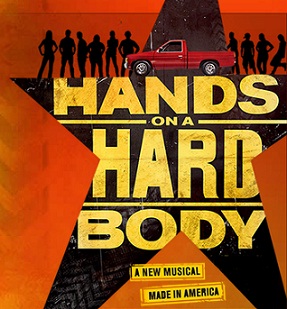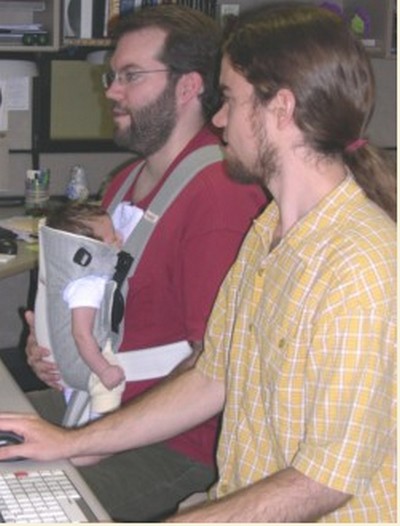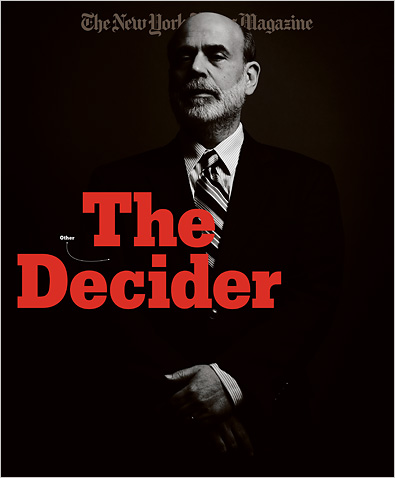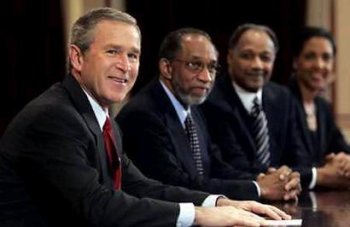We can probably agree that last night's primetime address was the President's best speech, and that from a certain point of view, it was just about equal to the occasion. Despite going a little overboard on the religious aspects, he said what everyone wanted him to say, but didn't think he would: New Orleans will be rebuilt, and he accepts responsibility "for the problem and for the solution." Along with that, it sure sounded like we got a hefty dose of something even more unexpected: big government.
On its surface, the speech seemed to promise that the federal government, working closely with the cities and states, would take responsibility for the recovery and rebuilding of New Orleans and the gulf states. He talked about the funding directives he's signed, the ambitious initiatives he'll propose to Congress, and the federally-assisted job banks he wants to set up. Looking closer, though, you'll see that this rebuilding plan -- the largest in our nation's history, he says -- will be driven not by the public sector, but by private industry. And the responsibilities that remain in the public sector will be taken over by the military. In this way, Bush has found a way to appear to be embrace New Deal/Great Society-style big government while actually throwing open the doors to unbridled capitalization and militarization. Rather than the liberal social plans we've seen on such occasions in the past, this time around we will see a neo-conservative approach to a national project.
Up to now, neo-conservatism has been defined by its foreign policy agenda. Its domestic agenda -- to the extent that it even exists -- has been the subject of much less attention. However, just as 9/11 gave the neo-conservatives the chance to apply their ideas to the real world, I believe that Katrina will offer them a similar opportunity to shape and apply their domestic agenda.
9/11 was a world-changing event, and when they were called upon to do something -- anything -- Bush & Co. immediately recognized the opportunity for what it was: a chance to start fresh, to do whatever they wanted. The country was in crisis and unwilling to seriously question whatever Bush came up with, as long as some action was taken. So when Cheney unveiled "the Bush Doctrine" on Meet the Press a few days later, no one questioned it.
Katrina offers the same opportunity, but on the domestic front. We all know we need radical change in the way the government responds to disaster, and we all know that the rebuilding will be on unprecedented scale. No model exists for how to proceed. In other words, it's a chance to start fresh, to come up with a plan to do something. Anything. Because of the enormity of the situation, as with 9/11, Bush is free from precedent. He can make stuff up, he can single-handedly rewrite the law (see you later, posse comitatus), he can accuse people of being unpatriotic when they question him. These things will happen.
This time around, of course, Bush's approval ratings and credibility are in the basement, and this could hinder his efforts to enact his plans. But I'm certain his numbers will begin rising because of the speech. For the first time since this mess began, he sounded in control, almost authoritative, and it was clear that he had a plan for how to proceed. (Although his insistence that he would order all the cabinet secretaries to come up with emergency response plans begs the question, "What the hell have they been doing since 9/11?"). Regardless, next week the Republicans in Congress will rally around him, finally, and his agenda will start moving forward.
But what is that agenda? Again, listening to his speech, you'd think we were in for a grand federally-funded public works project. But beyond the funding of the initial clean-up efforts, it was hard to discern how much of the money for the rebuilding would actually come directly from the government. In the coming weeks, I believe we will see that the government's financial role in all of this will not actually be all that significant (relative to what we've seen in the past, and relative to the total cost of the rebuilding), and will prove to abandon all those liberal/centrist principles we thought we heard in the speech last night in favor of an emerging neo-conservative domestic agenda, the central component of which will be privately-funded, large-scale economic development programs.
One of his three major proposals, the creation of an economic opportunity zone in the gulf states, represents a massive expansion of a recovery method that is a familiar plank in every urban conservative's platform: give businesses incentives to operate in depressed areas, and they will create jobs and an economic engine. Sounds great. But we've already gotten an idea of what these "incentives" might entail: Bush has waived the restrictions guaranteeing a market wage for workers involved in reconstruction efforts. We can only assume that reduced taxes and the relaxation of other regulations designed to protect workers and communities will follow. If not, what incentives would the companies have to get involved in this decimated region of the country? He didn't say it directly, but it almost sounded like Alabama, Mississippi, and Louisiana would all be turned into one giant Business Improvement District. Presumably, low taxes and low wage requirements will be offered to draw corporations to the area, with the benefits supposedly trickling down to all these workers who will be making less than a fair market income.
Putting the interests of the corporations above the interests of the workers is a far cry from the days of FDR and LBJ. Bush said workers from the affected areas will be considered for the reconstruction jobs, but what guarantees will there be once the corporations who have to fund all this rebuilding have their say? I imagine a repeat of what happened in the immediate aftermath of 9/11 at Ground Zero: the initial wave of emergency personnel, Red Cross volunteers, and union workers will be replaced by a flood of low-wage immigrant workers cleaning up the mess, receiving support services (meals, etc) from other low-wage, immigrant workers. I'm all for giving jobs to immigrants, legal or otherwise, but I'm concerned in this case that the workers receiving the jobs will not be the same people who lost theirs in the disaster, and that the workers who do receive the jobs will not get the wages or benefits that should be part-and-parcel of any job, especially ones so vital to the national interest, symbolically and economically. Put another way: who do you think will be cleaning up all the toxic materials that have washed all over the landscape? The same folks who used to live on that land?
Bush also spoke repeatedly of having small businesses, particularly minority-owned businesses, involved in the effort, in part as a means of balancing out the racially-imbalanced effects of poverty that has characterized (at least) that area of the country since its earliest days. I'm glad he said all of that, even if he doesn't follow through on it. But at the same time, I'm worried it's going to be like after 9/11 when he told America not to blame the Muslims, and then he just started bombing all of them over there and arresting all of them over here. It's good to tell America we need to support minority-owned businesses, but let's hope that Bush has the guts to continue supporting them when Halliburton, et al., complain when they are denied a contract that instead went to a smaller, minority-owned local firm.
I'm also hopeful that Bush's specific mention of the link between poverty and race is an indication of an unexpected part of the neo-con's domestic agenda: some progressive form of social justice. The approach to establishing social justice -- the government-enhanced "free" market, apparently -- might differ from liberal methods (affirmative action, special protections), but just the fact that it's a consideration is an encouraging step forward from paleo-conservative attitudes. It has been said elsewhere that neo-conservatism has its roots in certain brands of liberalism, and the neo-cons are concerned with issues of equality, social justice, and so on; Bush's repeated and specific references to these topics suggest that we will be hearing more about them.
But we will also be hearing about a less appealing part of the neo-con's new domestic agenda: the militarization of formerly civilian operations. Bush very clearly stated that next time around, the military will be in charge from the beginning. And it didn't sound like he meant the National Guard...I'm pretty sure he meant the active duty armed forces.
The lesson learned from FEMA's failure should have been that you don't appoint political cronies to the agency that is called on to Manage Federal Emergencies. But Bush has ignored that lesson in favor of a false one far easier to sell to Americans in a "do anything" state of mind: civilians are incapable of responding effectively when the shit hits the fan, therefore we need the military to step in. Instead, he might have said that FEMA's failure has called attention to the need for better planning and training, to hire more people, to put together a reserve system of civilian workers trained in emergency response who will be immediately ready next time. But Bush skipped that step, and went straight to the more obvious, but ultimately, more dangerous solution. To be sure, the military is currently the only government apparatus that runs with the efficiency and precision mandated by large-scale disasters. But the military is trained to kill people, not save them. As one soldier, a member of 4th25, the hip-hop group who recorded the album Live from Baghdad, recently said in an interview (paraphrasing here): "I can't remember one time where I was trained to hand a goat to somebody. But that's what they have us doing over there in Iraq." How many exercises does the average soldier perform in which he takes a sick baby from a mother who can't get on a bus? How many in which he has to nicely persuade a person to leave his home?
Because of 9/11 and the war in Iraq, Americans are for some reason now conditioned to equate images of soldiers aiming their weapons at helpless fellow citizens as a sign of order, rather than one of a situation gone horribly wrong. If the Bush plan to give authority to the military in natural disasters is enacted, the sight of machine-gun toting soldiers patrolling our streets will be familiar, not shocking. In addition to just issuing directives about who is in charge, will Bush also provide the military with substantive training in emergency response and peace-keeping? I'm not saying our military is not capable of responding to nearly any situation. I'm just saying that asking them to do so without proper training is potentially at least as fatal as letting an unprepared civilian agency take over. The problem with FEMA wasn't that it was run by civilians. It was that it was run by incompetent civilians.
The other benefit to Bush & Co. of the militarization of emergency response is that it further blurs the line between the war over there and the war over here. We can increase military spending even during times of peace reduced conflict because we need to prepare the military for "the next Katrina." Disagree? You must not be very patriotic, then. Bush very noticeably used the word "united" to describe how the nation should be in its response to Katrina, a purposeful echo of his (and other Republicans') words after 9/11, the message being that those who express dissent or even question his policies are guilty of being anti-American. Will we hear Bush leaning on the phrase "the lessons of Hurricane Katrina," as much as we've heard about "the lessons of September the Eleventh"? Let me tell you something, America, in case everyone forgets in the next few months: Hurricanes and terrorists are not the same thing.
But apparently, we can triumph over both through our patriotism and, of course, our faith in God. I'm not quite sure how or whether it fits into any real neo-conservative agenda, but Bush sure came on strong with the religious stuff last night. I guess this is his/Rove's nod to the Christian right: a back-door method of funding faith-based initiatives. I was shocked when he mentioned only two kinds of recipients of the (already) $100 million assets of the Bush Clinton Katrina Fund: the governors of the three states (which I knew), and faith-based organizations (which, of course, I didn't). What about the non-faith based groups that have been down there working themselves to death, no doubt burning through every dime and contingency plan they have? They'll get nothing from the fund, simply because they don't work in the name of a higher power? I hope this doesn't turn out to be the case.
Apart from his reference to the BCKF, he also explicitly asked us to give directly to faith-based organizations, i.e., local churches. I know the churches are putting some people up temporarily, but Jesus, don't their expenses amount to a drop in the bucket compared to the relief needed by, say, the actual people who lost everything in the hurricane? Are those people just supposed to wait to get their $5000 debit cards and below-market wages from Halliburton and Bechtel? Regardless, Bush's repeated mentions of faith-based organizations, his direct discussion of "grace" and a higher power, and of course, the almost creepy, coded reference to "a house not made by hands" was, to me, an implication that from here on out, we can expect to be hearing a lot more about the importance of (quasi-)public funding of faith-based initiatives.
Of course, all that stuff he talked about -- the enterprise zones, the homesteading, the massive rebuilding, the loan programs, the faith-based funding -- may never happen. He's only got a couple more years before he's given unofficial lame duck status (or senioritis, maybe, in his case), and there just might not be enough time to jumpstart all these ideas. As Amy observed, it's been four years since 9/11, and since then, a whole lot of nothing has been built down at Ground Zero, and that's just a few acres, not thousands of square miles.
But, assuming he and those close to him maintain their political will power, it seems that Bush's speech last night will serve as a blueprint for his domestic policy agenda for the remainder of his term, just as his speech after 9/11 did for his foreign policy, and Americans will finally get a taste of what happens when neo-cons enter both foreign and domestic entanglements. -ADM
I don't have much to add to ADM's thorough analysis of Bush's attempt to cast himself as some sort of Socialist bastard offspring of FDR and Keynes. I agree with Bush's basic theory that small businesses and local entrepreneurship are what is going to make the Gulf region functional, and that it might even help lift some people out of the poverty they've lived in for generations.
But tax breaks for small business owners, like tax breaks for the poor, aren't the magic solution because many struggling small businesses don't pay significant taxes anyway. I was glad to hear Bush mention low-interest loans to help local businesses get off the ground, but then again, look at how the Small Business Administration's special loan program for businesses affected by 9/11 worked out: a dog boutique in Utah got a special loan.
Long-term recovery from the Katrina disaster is shaping up to be primarily a construction and re-development project. Given the enormous leeway that developers have been given in recent years to do whatever they want in the name of business and growth (especially in booming southern and Sun Belt states) without some muscular oversight provided by the federal government to ensure responsible and just practices in rebuilding the Gulf coast, we're just going to see huge corporations using cheap labor getting those gigantic contracts. And the people who were poor before the hurricane will just get more of the same. -Amy






















